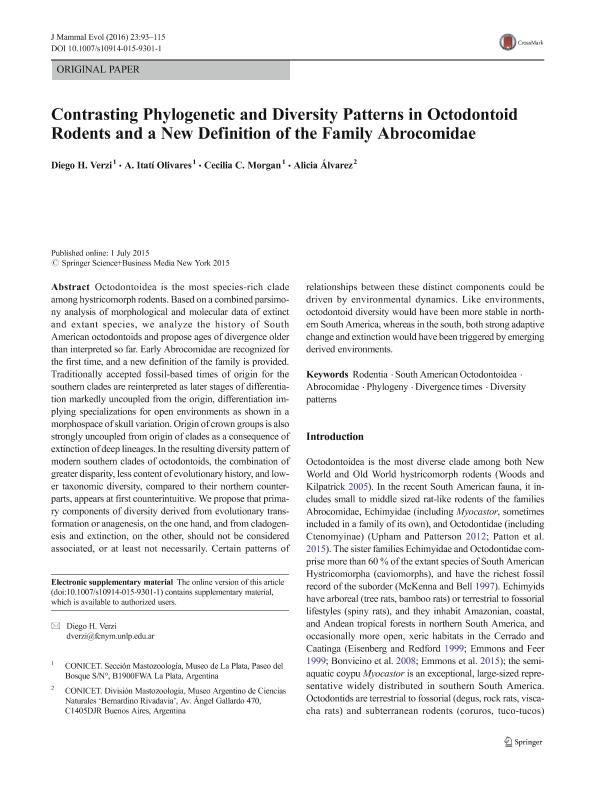Mostrar el registro sencillo del ítem
dc.contributor.author
Verzi, Diego Hector

dc.contributor.author
Olivares, Adriana Itati

dc.contributor.author
Morgan, Cecilia Clara

dc.contributor.author
Alvarez, Alicia

dc.date.available
2018-05-02T14:44:16Z
dc.date.issued
2016-03
dc.identifier.citation
Verzi, Diego Hector; Olivares, Adriana Itati; Morgan, Cecilia Clara; Alvarez, Alicia; Contrasting Phylogenetic and Diversity Patterns in Octodontoid Rodents and a New Definition of the Family Abrocomidae; Springer; Journal of Mammalian Evolution; 23; 1; 3-2016; 93-115
dc.identifier.issn
1064-7554
dc.identifier.uri
http://hdl.handle.net/11336/43822
dc.description.abstract
Octodontoidea is the most species-rich clade<br />among hystricomorph rodents. Based on a combined parsimony<br />analysis of morphological and molecular data of extinct<br />and extant species, we analyze the history of South<br />American octodontoids and propose ages of divergence older<br />than interpreted so far. Early Abrocomidae are recognized for<br />the first time, and a new definition of the family is provided.<br />Traditionally accepted fossil-based times of origin for the<br />southern clades are reinterpreted as later stages of differentiation<br />markedly uncoupled from the origin, differentiation implying<br />specializations for open environments as shown in a<br />morphospace of skull variation. Origin of crown groups is also<br />strongly uncoupled from origin of clades as a consequence of<br />extinction of deep lineages. In the resulting diversity pattern of<br />modern southern clades of octodontoids, the combination of<br />greater disparity, less content of evolutionary history, and lower<br />taxonomic diversity, compared to their northern counterparts,<br />appears at first counterintuitive.We propose that primary<br />components of diversity derived from evolutionary transformation<br />or anagenesis, on the one hand, and from cladogenesis<br />and extinction, on the other, should not be considered<br />associated, or at least not necessarily. Certain patterns of<br />relationships between these distinct components could be<br />driven by environmental dynamics. Like environments,<br />octodontoid diversity would have been more stable in northern<br />South America, whereas in the south, both strong adaptive<br />change and extinction would have been triggered by emerging<br />derived environments.
dc.format
application/pdf
dc.language.iso
eng
dc.publisher
Springer

dc.rights
info:eu-repo/semantics/openAccess
dc.rights.uri
https://creativecommons.org/licenses/by-nc-sa/2.5/ar/
dc.subject
South American Octodontoidea
dc.subject
Abrocomidae
dc.subject
Divergence Time
dc.subject
Diversity Patterns
dc.subject.classification
Otras Ciencias Biológicas

dc.subject.classification
Ciencias Biológicas

dc.subject.classification
CIENCIAS NATURALES Y EXACTAS

dc.title
Contrasting Phylogenetic and Diversity Patterns in Octodontoid Rodents and a New Definition of the Family Abrocomidae
dc.type
info:eu-repo/semantics/article
dc.type
info:ar-repo/semantics/artículo
dc.type
info:eu-repo/semantics/publishedVersion
dc.date.updated
2018-04-27T18:53:19Z
dc.journal.volume
23
dc.journal.number
1
dc.journal.pagination
93-115
dc.journal.pais
Alemania

dc.journal.ciudad
Berlin
dc.description.fil
Fil: Verzi, Diego Hector. Consejo Nacional de Investigaciones Científicas y Técnicas; Argentina. Universidad Nacional de La Plata. Facultad de Ciencias Naturales y Museo. División Zoología de Vertebrados. Sección de Mastozoología; Argentina
dc.description.fil
Fil: Olivares, Adriana Itati. Consejo Nacional de Investigaciones Científicas y Técnicas; Argentina. Universidad Nacional de La Plata. Facultad de Ciencias Naturales y Museo. División Zoología de Vertebrados. Sección de Mastozoología; Argentina
dc.description.fil
Fil: Morgan, Cecilia Clara. Consejo Nacional de Investigaciones Científicas y Técnicas; Argentina. Universidad Nacional de La Plata. Facultad de Ciencias Naturales y Museo. División Zoología de Vertebrados. Sección de Mastozoología; Argentina
dc.description.fil
Fil: Alvarez, Alicia. Consejo Nacional de Investigaciones Científicas y Técnicas. Oficina de Coordinación Administrativa Parque Centenario. Museo Argentino de Ciencias Naturales "Bernardino Rivadavia"; Argentina
dc.journal.title
Journal of Mammalian Evolution

dc.relation.alternativeid
info:eu-repo/semantics/altIdentifier/doi/http://dx.doi.org/10.1007/s10914-015-9301-1
dc.relation.alternativeid
info:eu-repo/semantics/altIdentifier/url/https://link.springer.com/article/10.1007%2Fs10914-015-9301-1
Archivos asociados
